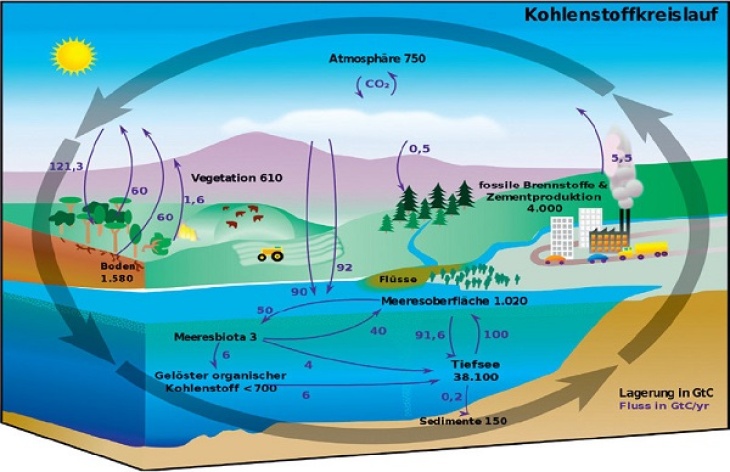Pump for climate
Climate change is fundamentally influenced by the sequestration of carbon in the ocean. The dissolved organic carbon is produced and metabolized by microbial and ecological processes – the phenomenon is known as the microbial carbon pump. Researchers with the participation of the Helmholtz-Zentrum Hereon have discovered that this pump has far more leverage: This pump has far more leverage than hitherto assumed. They have now published their years of accumulated expertise in the journal Nature Review Microbiology.

The carbon cycle is a highly sensitive system. Minor changes can have a lasting impact on the climate. Graphic: Max-Planck-Institut Jena / public domain
The ocean has always been a regulator of climate change. The researchers' new findings: Firstly, the microbial carbon pump (MCP) is probably a far more significant lever for climate change than hithrto assumed. Considering global carbon reservoirs, the oceans hold over 50 times moreCO2 than the atmosphere. This means that small changes in the ocean carbon reservoir are barely noticeable but can have dramatic effects in the atmosphere. Secondly, bacteria and viruses play a major role in the deep ocean in terms of the reservoir of refractory, i.e. stable, dissolved organic carbon (RDOC). And thirdly, aided by modeling, the processes in deeper ocean waters could be better understood. The researchers also postulate that these processes play a greater role in coastal regions than in the high seas.
Small pump, big impact
As a general rule, when algae sink to the bottom of the sea and are decomposed by bacteria and viruses, CO2 is produced and, to a small but important extent, refractory, dissolved organic carbon compounds. Depending on the conditions, these are stored in the water column for centuries or released into the atmosphere as CO2. The term marine carbon pump generally refers to the fact that the CO2 reaches the depths of the ocean and is stored there. In the microbial variant as part of this marine carbon pump, this happens via organic metabolism and ecological processes.
Minor changes have a strong impact on atmospheric CO2 levels and therefore on the climate. The carbon pump is also susceptible to climatic and anthropogenic influences. If more nutrients - for example from manure or fertilizers - enter the oceans via the rivers, oxygen is consumed, CO2 is emitted, and the stability of the dissolved organic carbon is also influenced. In addition to the pump as a key process, global warming remains a decisive factor, as it influences, among other things, the oxygen in the ocean and thus the pump.
Disruptive progress for the field of research
The insights into the molecular structure of dissolved organic carbon are among the major advances in chemical oceanography and thus the study, which were made possible by high-resolution analytical methods. "This study represents more than ten years of work. It is another piece of the puzzle in understanding the carbon cycle," says Prof Helmuth Thomas, Director of the Hereon Institute of Carbon Cycles, who supported first author Dr Jiao Nianzhi from Xiamen University in China with around 30 researchers. "However, there are still questions regarding the understanding of the mechanisms and their interactions. To answer these, observations in the real world, experimental and model studies and simulations with digital twins are needed," Thomas continues.
With further data collection, future studies could use modeling to further decipher interactions between microorganisms. Models can unravel the effects of climate change of targeted and untargeted anthropogenic influences. Furthermore, machine learning can visualize geological scenarios and projections of carbon storage. Ultimately, the combination of observational, experimental and theoretical approaches will help shed further light on the microbial carbon.
Further Information
Kontakt
Institute of Carbon Cycles, Helmholtz-Zentrums Hereon
Phone: T: +49 (0)4152 87-2805
Communication and Media I Helmholtz-Zentrum Hereon
Phone: T: +49 (0)4152 87-1677
